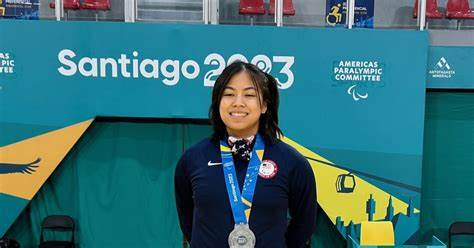
The last three years have been full of change for American Judoka Liana Mutia. After competing in her first Paralympic Games in Tokyo in 2021 she has found herself as a college graduate, in a new job, and a new town and those things have helped her come in to her second Games more relaxed.
Those changes have created some security in her life, for many para athletes winning at the Paralympics is a must to earn money. This perhaps speaks to the discrimination that people with disabilities face every day. For Mutia that security gives freedom.
“That’s the biggest change between my first Paralympics when I was a student and I had no money,” said Mutia. “Now I have a job, it’s disposable income. I am extremely happy to represent my country on the world’s biggest stage and then going back to my regular day job instead of going back and having to do all this work to survive.”
Not every athlete has that luxury and that is something the American doesn’t take for granted.
“This isn’t there for other athletes. If they don’t get a medal or they lose they lose their job, their resources, their home. I’ve been able to mitigate failure, I’m not worried about losing my home.”

That doesn’t mean that those changes don’t come with challenges. Even couch warriors know that it’s hard to work 40 hours a week and compete at a sport, that increases infinitely for an elite athlete like Mutia where it’s essentially two full-time jobs.
“I work a regular nine to five and I train 30 to 40 hours a week,” explains Mutia. “There’s a gym literally a few floors above where I work so I train all morning right before work. It’s very meticulous and organized. I majored in project management so it’s just management skills and resources.”
The other thing elite athletes have to deal with is time off of work and fortunately her employer has been understanding. Much like other workers, she just has to line up her calendar and request the time off but she says she feels comfortable doing so.
Beyond her personal changes much has changed around the Paralympics in the last three years. Judo has changed how it works, with weight class changes and for the first-time classifications.
“I feel more natural in this weight class. Instead of feeling undersized or oversized or whatever I feel natural at 57 kilos rather than 63 which is great,” said Mutia. “When I was younger I felt a bit undersized. From 21 to 25 (years-old) I feel like my body has only got better and I feel like physically I’ve adapted to the sport.”
Mutia is currently ranked number one in the world, that may heighten expectations, she’s certainly expectant, but for her that doesn’t equate to pressure.
“If anything the ranking takes a lot of pressure off. Qualification isn’t as stressful and so I can be more confident going in to Paris, and not stress about dropping out early, I know what I can do. Gold is my goal.”
Mutia will compete in the women’s B1 57kg classification in Paris coming in after winning silver at the 2023 Para Pan American Games.